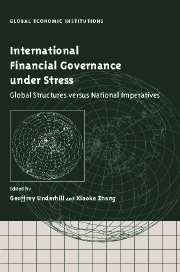Book contents
- Frontmatter
- Contents
- List of figures
- List of tables
- List of contributors
- Acknowledgements
- Introduction: global market integration, financial crises and policy imperatives
- I Financial globalisation and policy responses: concepts and arguments
- 1 Reform of the international financial architecture: what has been written?
- 2 Costs and benefits of financial globalisation: concepts, evidence and implications
- 3 Capital controls: the neglected option
- 4 Global structures and political imperatives: in search of normative underpinnings for international financial order
- II Globalisation, financial crises and national experiences
- III Private interests, private–public interactions and financial policy
- IV Building the new financial architecture: norms, institutions and governance
- Conclusion: towards the good governance of the international financial system
- Index
4 - Global structures and political imperatives: in search of normative underpinnings for international financial order
Published online by Cambridge University Press: 22 September 2009
- Frontmatter
- Contents
- List of figures
- List of tables
- List of contributors
- Acknowledgements
- Introduction: global market integration, financial crises and policy imperatives
- I Financial globalisation and policy responses: concepts and arguments
- 1 Reform of the international financial architecture: what has been written?
- 2 Costs and benefits of financial globalisation: concepts, evidence and implications
- 3 Capital controls: the neglected option
- 4 Global structures and political imperatives: in search of normative underpinnings for international financial order
- II Globalisation, financial crises and national experiences
- III Private interests, private–public interactions and financial policy
- IV Building the new financial architecture: norms, institutions and governance
- Conclusion: towards the good governance of the international financial system
- Index
Summary
For ordinary people, firms and governments of the affected countries and regions, the financial crises in east Asia, Russia and Latin America were major events of enormous economic and political consequence. The fallout manifested itself in soaring interest rates, repressed investment activities and outright recession. In connection with these economic woes, unemployment rose to an unprecedented high and the income of a wide range of social groups declined sharply, leading to increased social instability and political unrest. In the crisis-stricken economies, political leaders struggled to balance strong external pressures from international financial institutions (IFIs), creditor countries and market agents for neo-liberal reforms with vigorous demands from domestic constituents for protection against growing international financial volatility.
These developments, despite national and regional diversity, have a common background: the process of global financial integration. This process has increasingly entangled once essentially closed and discreet national markets, greatly enhancing movements of capital across national frontiers. It is widely perceived to have generated increased strains in domestic sociopolitical and policy-making processes and intensified the conflicts between the dictates of financial globalisation and national policy imperatives. These tensions have raised serious doubts over the sustainability of economic growth in an environment of untamed capital movements, calling into question the legitimacy of the prevailing market order in the global system. Building on earlier work on the political economy of international finance, this chapter seeks to interpret, in three different but interrelated arguments, the constraints of global capital mobility and their consequences for democratic governance.
- Type
- Chapter
- Information
- International Financial Governance under StressGlobal Structures versus National Imperatives, pp. 77 - 98Publisher: Cambridge University PressPrint publication year: 2003
- 3
- Cited by



